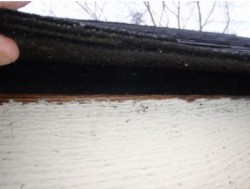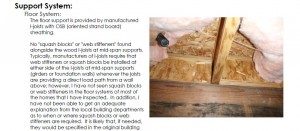Inspections and Due Diligence
There are many facets of due diligence that should be covered once you have an offer accepted. These can include many types of inspections and investigations, including but not limited to:
- Home Inspection
- Pest Inspection
- Well and Water Quality Inspections
- Sewer Line or Septic Inspections
- Chimney Inspection
- Surveys
- Checking City or County public records
All of these cannot be covered in detail here, but your real estate professional representing you will guide you as to what is needed. This is merely an overview.
What a Home Inspection Should Cover
Home inspections will vary depending on the type of property you are purchasing. A large historic home, for example, will require a more specialized inspection than a small condominium. However, the following are the basic elements that a home inspector will check. You can also use this list to help you evaluate properties you might purchase.
For more information, try the virtual home inspection at www.ASHI.org, the Web site of the American Society of Home Inspectors.
Structure: A home’s skeleton impacts how the property stands up to weather, gravity, and the earth. Structural components, including the foundation and the framing, should be inspected.
Exterior: The inspector should look at sidewalks, driveways, steps, windows, and doors. A home’s siding, trim, and surface drainage also are part of an exterior inspection.
- Doors and windows
- Siding (brick, stone, stucco, vinyl, wood, etc.)
- Driveways/sidewalks
- Attached porches, decks, and balconies
 Roofing: A well-maintained roof protects you from rain, snow, and other forces of nature. Take note of the roof’s age, conditions of flashing, roof draining systems (pooling water), buckled shingles, loose gutters and downspouts, skylight, and chimneys.
Roofing: A well-maintained roof protects you from rain, snow, and other forces of nature. Take note of the roof’s age, conditions of flashing, roof draining systems (pooling water), buckled shingles, loose gutters and downspouts, skylight, and chimneys.
Plumbing: Thoroughly examine the water supply and drainage systems, water heating equipment, and fuel storage systems. Drainage pumps and sump pumps also fall under this category. Poor water pressure, banging pipes, rust spots, or corrosion can indicate problems.
Heating: The home’s heating system, vent system, flues, and chimneys should be inspected. Look for age of water heater, whether the size is adequate for the house, speed of recovery, and energy rating.
Air Conditioning: Your inspector should describe your home cooling system, its energy source, and inspect the central and through-wall cooling equipment. Consider the age and energy rating of the system.
Interiors: An inspection of the inside of the home can reveal plumbing leaks, insect damage, rot, construction defects, and other issues. An inspector should take a close look at:
- Walls, ceilings and floors
- Steps, stairways, and railings
- Countertops and cabinets
- Garage doors and garage door systems
Ventilation/insulation: To prevent energy loss, check for adequate insulation and ventilation in the attic and in unfinished areas such as crawlspaces. Also look for proper, secured insulation in walls. Insulation should be appropriate for the climate. Excess moisture in the home can lead to mold and water damage.
Fireplaces: They’re charming, but they could be dangerous if not properly installed. Inspectors should examine the system, including the vent and flue, and describe solid fuel burning appliances.
Source: American Society of Home Inspectors (www.AHSI.org)
10 Questions to Ask Home Inspectors
Before you make your final buying or selling decision, you should have the home inspected by a professional. An inspection can alert you to potential problems with a property and allow you to make an informed decision. Ask these questions to prospective home inspectors:
- Will your inspection meet recognized standards? Ask whether the inspection and the inspection report will meet all state requirements and comply with a well-recognized standard of practice and code of ethics, such as the one adopted by the American Society of Home Inspectors or the National Association of Home Inspectors. Customers can view each group’s standards of practice and code of ethics online at www.ashi.org or www.nahi.org. ASHI’s Web site also provides a database of state regulations.
- Do you belong to a professional home inspector association? There are many state and national associations for home inspectors, including the two groups mentioned in No. 1. Unfortunately, some groups confer questionable credentials or certifications in return for nothing more than a fee. Insist on members of reputable, nonprofit trade organizations; request to see a membership ID.
- How experienced are you? Ask how long inspectors have been in the profession and how many inspections they’ve completed. They should provide customer referrals on request. New inspectors also may be highly qualified, but they should describe their training and let you know whether they plan to work with a more experienced partner.
- How do you keep your expertise up to date? Inspectors’ commitment to continuing education is a good measure of their professionalism and service. Advanced knowledge is especially important in cases in which a home is older or includes unique elements requiring additional or updated training.
- Do you focus on residential inspection? Make sure the inspector has training and experience in the unique discipline of home inspection, which is very different from inspecting commercial buildings or a construction site. If your customers are buying a unique property, such as a historic home, they may want to ask whether the inspector has experience with that type of property in particular.
- Will you offer to do repairs or improvements? Some state laws and trade associations allow the inspector to provide repair work on problems uncovered during the inspection. However, California forbids it for home inspectors as a conflict of interest. Contact your local ASHI chapter to learn about the rules in your state. Pest Inspectors are allowed to bid and do work.
- How long will the inspection take? On average, an inspector working alone inspects a typical single-family house in two to three hours; anything significantly less may not be thorough. If your customers are purchasing an especially large property, they may want to ask whether additional inspectors will be brought in.
- What’s the cost? Costs can vary dramatically, depending on your region, the size and age of the house, and the scope of services. Customers should be wary of deals that seem too good to be true.
- What type of inspection report do you provide? Ask to see samples to determine whether you will understand the inspector’s reporting style. Also, most inspectors provide their full report within 24 hours of the inspection.
- Will I be able to attend the inspection? The answer should be yes. A home inspection is a valuable educational opportunity for the buyer. An inspector’s refusal to let the buyer attend should raise a red flag.
Source: Rob Paterkiewicz, executive director, American Society of Home Inspectors, Des Plaines, Ill., www.ashi.org.
Tips for Finding the Perfect Neighborhood
Your neighborhood has a big impact on your lifestyle. Follow these steps to find the perfect community to call home.
- Is it close to your favorite spots? Make a list of the activities — movies, health club, church, etc. — you engage in regularly and stores you visit frequently. See how far you would have to travel from each neighborhood you’re considering to engage in your most common activities.
- Check out the school district. This is especially important if you have children, but it also can affect resale value. The Department of Education in your town can probably provide information on test scores, class size, percentage of students who attend college, and special enrichment programs. If you have school-age children, visit schools in the neighborhoods you’re considering. Also, check out our schools page.
- Find out if the neighborhood is safe. Ask the police department for neighborhood crime statistics. Consider not only the number of crimes but also the type — such as burglaries or armed robberies — and the trend of increasing or decreasing crime. Also, is crime centered in only one part of the neighborhood, such as near a retail area?
- Determine if the neighborhood is economically stable. Check with your local city economic development office to see if income and property values in the neighborhood are stable or rising. What is the percentage of homes to apartments? Apartments don’t necessarily diminish value, but do mean a more transient population. Do you see vacant businesses or homes that have been for sale for months?
- See if you’ll make money. Ask a local REALTOR® or call the local REALTOR® association to get information about price appreciation in the neighborhood. Although past performance is no guarantee of future results, this information may give you a sense of how good of an investment your home will be. A REALTOR® or the government planning agency also may be able to tell you about planned developments or other changes in the neighborhood — like a new school or highway — that might affect value.
- Make personal observations. Once you’ve narrowed your focus to two or three neighborhoods, go there and walk around. Are homes tidy and well maintained? Are streets quiet? How does it feel? Pick a warm day if you can and chat with people working or playing outside.
How High Tech is Your Home
If the latest technology or entertainment options are important in your new home, add the following questions to your buyer’s checklist.
- Are there enough jacks in every room for cable TV and high-speed Internet hookups?
- Are there ample telephone extensions or jacks?
- Is the home pre-wired for home theater or multiroom audio and video? Does it have in-wall speakers?
- Does the home have a local area network (LAN) for linking computers?
- Does the home already have wiring for DSL or another high-speed Internet connection?
- Does the home have multizoning heating and cooling controls with programmable thermostats?
- Does the home have multiroom lighting controls, window-covering controls, or other home automation features?
- Is the home wired with multipurpose in-wall wiring that allows for reconfigurations to update services as technology changes?
What Not to Overlook on a Final Walk-Through
It’s guaranteed to be hectic right before closing, but you should always make time for a final walk-through. Your goal is to make sure that your home is in the same condition you expected it would be. Ideally, the sellers already have moved out. This is your last chance to check that appliances are in working condition and that agreed-upon repairs have been made. Here’s a detailed list of what not to overlook for on your final walk-through. Note: in the stand contract language the walk-through is not a contingency; meaning, generally, you cannot back out of a contract based on dissatisfaction with something discovered in a walk-through. However, it can be the basis for legal action. Ask your real estate professional to explain your rights under a walk-through clause in a contract.
Make sure that:
- Repairs you’ve requested have been made. Obtain copies of paid bills and warranties.
- There are no major changes to the property since you last viewed it.
- All items that were included in the sale price — draperies, lighting fixtures, etc. — are still there.
- Screens and storm windows are in place or stored.
- All appliances are operating, such as the dishwasher, washer and dryer, oven, etc.
- Intercom, doorbell, and alarm are operational.
- Hot water heater is working.
- No plants or shrubs have been removed from the yard.
- Heating and air conditioning system is working
- Garage door opener and other remotes are available.
- Instruction books and warranties on appliances and fixtures are available.
- All personal items of the sellers and all debris have been removed. Check the basement, attic, and every room, closet, and crawlspace.
| Attachment | Size |
| California Real Estate Inspection Association Standards of Practice (PDF) | 26.4 KB |


